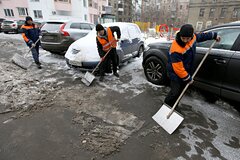Kommersant: Central Bank economists have calculated that migration in Russia does not affect the unemployment rate

Photo: Agency “Moscow”
Economists from the Far Eastern divisions of the Central Bank (CB) Maria Kudaeva and Ivan Redozubov assessed the impact of labor migration on the labor market and economic activity in Russia. Writes about this “Kommersant” with reference to the relevant work.
Experts based on modern SVAR models gave an empirical assessment of the effects of migration in Russia, including for 12 “receiving” regions (megacities, Tatarstan, Krasnodar Territory, Tyumen Region) and 21 “receiving” regions of the country (including the regions of the Far East and Transbaikalia, the North Caucasus, parts of Siberia and the Volga region), in which migration processes are accentuated.
The authors of the study concluded that internal and external migration in Russia, at least on the scale of 2001–2019, has practically no effect on the unemployment rate in the country. The influx of migrants to developing regions increases their economic activity. Economists also calculated that the growth of wages in the regions that “send” migrants to the “receiving” regions is indeed observed, but is minimal in volume.
According to experts, in the country as a whole, the inflow of external migrants by one percent correlates with a growth of GDP by 0.1 percent. In the regions “attracting” migrants in the last decade, the same increase in inflow hardly increases the growth rates of leading indicators of GRP (by 0.04 percent). In the regions that give up, the release of jobs by migrants through an increase in the outflow of jobs from them by one percent adds 0.02–0.03 percent to the real wages (that is, only a few rubles to the average salary in these regions).
Thus, Kudaeva and Redozubov concluded, “the consequences of migration for unemployment have not been determined either in Russia or in the regions.”
Earlier, the head of the Central Bank Elvira Nabiullina called the shortage of labor migrants one of the reasons for the accelerated rise in food prices. She also linked the rise in food prices to a not very good harvest and an increase in global prices.
Prior to that, the Bloomberg agency came to the conclusion that the labor shortage in Russia slows down the recovery of the country's economy after the pandemic. Millions of migrant workers left Russia after border closures in 2020. Entry restrictions have now been relaxed, but many do not want to return to the country because they are afraid to find themselves in a problematic situation due to the danger of new lockdowns. At the same time, according to the Russian Academy of National Economy and Public Administration under the President of Russia, the number of foreign workers decreased even before the start of the pandemic from 4.5 to 3 million.

